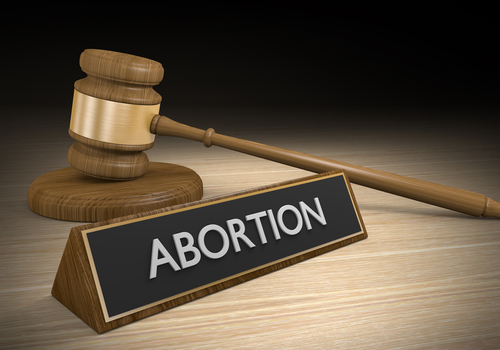Abortion opponents cite Justice Ginsburg in arguments to overturn Roe v. Wade

Image from Shutterstock.
Many of the briefs seeking to overturn the constitutional right to abortion established in Roe v. Wade are citing early misgivings about the decision by the late U.S. Supreme Court Justice Ruth Bader Ginsburg.
Among them are the Supreme Court brief submitted by Mississippi Attorney General Lynn Fitch, who is seeking to uphold the state law banning most abortions after 15 weeks of pregnancy, the Washington Post reports.
Fitch has argued that there is no constitutional right to abortion, and Roe should be overruled along with the 1992 decision affirming the right to abortion, Planned Parenthood of Southeastern Pennsylvania v. Casey.
Fitch cited Ginsburg in arguing that that Roe and Casey failed to end the debate over abortion. Indeed, the cases “have made matters worse,” Fitch said, citing a 1985 law review article by Ginsburg.
Many of the 70 amicus briefs that also seek to overturn Roe in the Mississippi case, Dobbs v. Jackson Women’s Health Organization, also cite Ginsburg, according to the Washington Post.
Ginsburg argued in the law review article that the Supreme Court in Roe “ventured too far in the change it ordered and presented an incomplete justification for its action.”
Ginsburg argued that the Roe court should have struck down the Texas law before it, which made it a crime to “procure an abortion” except “by medical advice for the purpose of saving the life of the mother.” The law was the most extreme abortion ban in existence, Ginsburg said.
Instead, the court went further when it adopted a trimester approach that one commentator described as reading “like a set of hospital rules and regulations,” Ginsburg said in the article.
The “sweep and detail of the opinion” stimulated a right-to-life movement and laws aimed at minimizing Roe’s impact, Ginsburg said. Before the opinion, the trend was toward liberalization of abortion statutes.
Ginsburg made the same point in a speech published in 1992.
“Doctrinal limbs too swiftly shaped, experience teaches, may prove unstable,” she wrote. The sentence is “widely quoted” by Roe opponents, the Washington Post said.
Ginsburg also argued in the article and speech that the Supreme Court’s position in Roe was weakened by anchoring the decision to a concept of personal autonomy derived from the due process clause. Instead, Ginsburg had argued, the opinion should have cited constitutional equal protection principles.
The conflict, she wrote, “is not simply one between a fetus’ interests and a woman’s interests, narrowly conceived, nor is the overriding issue state versus private control of a woman’s body for a span of nine months. Also in the balance is a woman’s autonomous charge of her full life’s course.”
Despite the early criticism, Ginsburg told Jeffrey Rosen, a professor at the George Washington University Law School, in a 2018 interview that the result in Roe is “absolutely right.” Abortion rights shouldn’t be left to the states, she told Rosen, the president and CEO of the National Constitution Center.
“My idea of how choice should have developed was not a privacy notion, not a doctor’s right notion, but a woman’s right to control her own destiny, to be able to make choices without a Big Brother state telling her what she can and cannot do,” Ginsburg said.
Hat tip to How Appealing.
Write a letter to the editor, share a story tip or update, or report an error.


